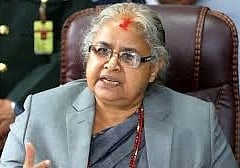Nepal is at a turning point after one of the most dramatic weeks in its modern history. Deadly demonstrations over corruption and a short-lived social media ban forced Prime Minister KP Sharma Oli to resign on Tuesday, leaving parliament in flames and the army in control of the streets.
At least 51 people were killed in the worst violence since the end of a Maoist civil war and abolition of the monarchy in 2008. Soldiers have since imposed a curfew, while the country’s 30 million citizens wait for a political solution.
Against this backdrop, a new name has emerged as the frontrunner for interim leadership: Sushila Karki, Nepal’s first female chief justice. Army chief General Ashok Raj Sigdel met key figures of the “Gen Z” protest movement on Wednesday, and activists say Karki, 73, is at the top of their list.
“Right now, Sushila Karki’s name is coming up to lead the interim government,” activist Rakshya Bam told AFP. Even Kathmandu Mayor Balendra Shah, himself once floated as a possible leader, publicly endorsed her candidacy.
Nepal’s first woman chief justice
Karki is no stranger to Nepal’s turbulent politics. Born in Biratnagar in 1952, she earned degrees in political science and law before joining Tribhuvan University as a lecturer.
She became an advocate in the Supreme Court in 1989 and rose steadily through the judiciary. In 2016 she was appointed Nepal’s first woman chief justice, a landmark moment for gender representation in the country’s highest court.
Her tenure was marked by outspoken rulings on corruption and constitutional overreach, which won her both admiration and controversy. Karki’s reputation for independence and her insistence on judicial integrity have left a lasting imprint on Nepal’s legal system. For many young protesters, she embodies the kind of principled leadership absent in mainstream politics.
Independent voice in a political vacuum
Since retiring in 2017, Karki has written extensively on governance and the rule of law. She is widely seen as an independent figure with no direct party affiliation, which has made her acceptable to the disparate groups now vying to shape Nepal’s future.
In comments to AFP this week, she stressed that “experts need to come together to figure out the way forward” and said parliament “still stands” despite the chaos.
Supporters argue her legal background could help stabilise Nepal’s institutions during a delicate transition, while critics worry about her lack of executive experience.
Still, with Nepal’s traditional political elite scattered and discredited, Karki’s image as an impartial outsider is drawing attention both at home and abroad.
Other contenders
Alongside Karki, several other names surfaced during the protesters’ discussions about Nepal’s political future. Kathmandu Mayor Balendra Shah, a 35-year-old former engineer and rapper, was one of the most visible alternatives but publicly withdrew his own candidacy, posting on Facebook that he “fully supports the proposal” to back Karki instead.
Veteran leaders from the old guard — including 79-year-old Sher Bahadur Deuba of the Nepali Congress and other senior coalition figures — have largely vanished from public view since the protests began.
Discord forums and street meetings continue to debate potential interim leaders, but activists and observers alike say the field remains fragmented, with “competing interests” and “competing voices” in the decentralised movement.
Profile: Sushila Karki
Age: 73
Hometown: Biratnagar, eastern Nepal
Profession: Former Chief Justice of the Supreme Court (2016–2017)
Education: Degrees in Political Science and Law from Tribhuvan University
Current role: Academic and legal commentator
Sign up for the Daily Briefing
Get the latest news and updates straight to your inbox
Network Links
GN StoreDownload our app
© Al Nisr Publishing LLC 2026. All rights reserved.

